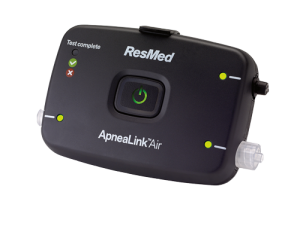What is often the first sign of sleep apnea? It is often associated with snoring, but just because you snore doesn’t mean you have sleep apnea. In order to help in the diagnosis of sleep apnea, Dr. Amanda Juarez may make an evaluation based on your signs and symptoms—a tip to a sleep specialist may be in order, too.
A sleep specialist will work with you to determine if further evaluation is needed, which often means overnight monitoring of your breathing and other body functions while you are sleeping. Additionally, advancements in technology allow home testing, which continues to gain popularity because of the ease and comfort of being in your own home, as well as being less expensive.
Diagnosis Tests
In order to detect sleep apnea, there is an array of tests that might be recommended for you. Here are a couple diagnosis and testing options for sleep apnea:
- Nocturnal Polyscomnography – With this test, you will be hooked up to equipment that monitors your heart, lungs and brain activity, breathing patterns, arm and leg movements, and blood oxygen levels while you sleep. Through these tests your doctor and determine if you are suffering from sleep apnea.
- Home Sleep Tests – Your doctor may also provide you with simplified tests to be used at home to diagnose sleep apnea. These tests involve measuring your heart rate, blood oxygen level, airflow and breathing patterns. If you are suffering from sleep apnea the rest results will show drops in your oxygen level during apneas and subsequent rises with awakenings.

Visit Your Dentist
If you have sleep apnea, it is important to visit your doctor, as they may refer you to an ear, nose and throat specialist to rule out any blockage in your nose or throat. An evaluation by a heart doctor or a doctor who specializes in the nervous system may also be necessary to look for causes of central sleep apnea.
Contact Dr. Amanda Juarez of Sweet Dreams Sleep Solutions for more information on sleep apnea and how you can get a proper diagnosis to begin treatment planning immediately.
